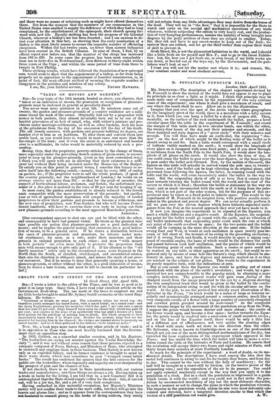"TAXES ON HOUSES AND GARDENS."
Seeing, then, that the proprietor, poverty-stricken by the change of times; more especially under the prevailing &rite system-of grain-rents,- is' necessi- tated to keep up -his pleasure-grounds, (even-in the most economical way,) I think you will agree with me in allowing- that their existence is a suffi- cient tax without their being included under the House-tax of the Budget. To satisfy you on thinpoint in general terms, I consider this luxury to re- solve itself into the following result,—namelv, that for every 1801. of outlay
on gardens &e., if the proprietor were to-sell whole produce, (I speak of the country generally, not the neighbourhood of Londoni) he would on an average receive not more. than : so that for the pride of ancestry, the support of horticultural labour, seedsmen, andflorists, the unfortunate pos- sessor of a- fine place is mulcted to the tune of 80 per cent for keeping it up. In most cases the garden establishment is: already reduced to the lowest scale compatible with the mere preservation of the grounds; but another year or two of agricultural depression will compel the majority of landed proprietors to allow their gardens and grounds to become a wilderness, and the new race of proprietors, now Free-traders, but who will become Protec- tienigt landlords, will have to exercise their own taste in laying out their new pleasure-grounds according to the most approved Manchester patterns. Sra—In your topic of the 19th instant, headed as above, you observe, that "taken as an indication of means, the possession or oceupation of pleasure-- grounds must be reckoned in general as peculiarly direct.' You never were more mistaken in your life. Ih nineteen oases out of twenty, the garden and pleasure-grounds of a country residence are a mill- stone round the neck of the owner. Originally laid out by a progenitor with money in both pockets, they almost invariably turn out to be one of the hardest grievances of an heir of entail, who, with widow's jointure and pro- visions under marriage-settlements, as well as other burdens, feels his nose at the grindstone from the day of his succession till the day of his death. The old family mansion, with-gardens and grounds befitting its degree, are handed over to him as an heirloom. To alter them and convert them into arable land, as you would have it, would in most cases cost more than the fee-simple of the land; and if even the estate is so unfettered and handed over to a millionaire, its value would be materially reduced by such a pro- ceeding.
AGRICOLA.
DOur correspondent appears to shut one eye and be blind' with the other, and consequently to have bad general vision. lie treats as the greatest mis- take- possible our notion that pleasure-grounds are a good indication of means; and he implies the general notion, that mansions are a good indica- tion of means, to be a general error. If he draws a distinction between the cases of pleasure-grounds and mansions, he labours under men- tat strabismus; for men, as a rule, make their mansions and their Founds in rational proportion to each other ; and men "'with money in both pockets" are even more likely to preserve the proportion than men-with means enough to give only part of it. If his allusion to the "old family mansion" refers only to the exceptional cases, more frequent in the North than the South, of entailed, overcharged, and encumbered estates, then also- his objection is obliquely aimed, and misses the mark of our gene- ral statement_ But if he means to deny that generally speaking a house, or pleasure-grounds, or either without the other, is a good indication of means, then he denies a bare truism, and must be left to cherish his particular be- lieLT


























 Previous page
Previous page